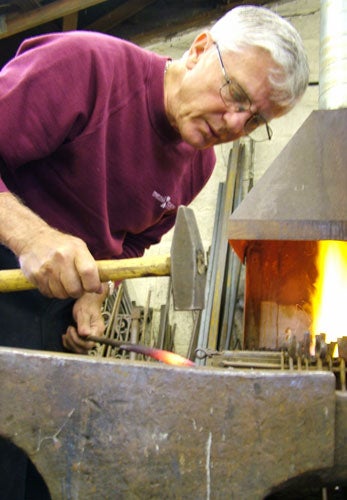I Want Your Job: Blacksmith
'Metalwork isin your genes'

Your support helps us to tell the story
This election is still a dead heat, according to most polls. In a fight with such wafer-thin margins, we need reporters on the ground talking to the people Trump and Harris are courting. Your support allows us to keep sending journalists to the story.
The Independent is trusted by 27 million Americans from across the entire political spectrum every month. Unlike many other quality news outlets, we choose not to lock you out of our reporting and analysis with paywalls. But quality journalism must still be paid for.
Help us keep bring these critical stories to light. Your support makes all the difference.
Don Barker, 63, is an artist and commercial blacksmith in Yorkshire. He runs his own company, Don Barker Ltd.
What do you actually do?
I design and make pieces in different metals at my forge. We take commissions for architectural work such as gates, staircases and railings. It's a complete cross-section, from new designs to restoration work – for example, I made some modern stainless steel gates for a park in York recently, but I've also made an art nouveau staircase which I designed myself. We also do ecclesiastical projects. I've just finished a copper cross for a church, and I've made cathedral doors using five tons of bronze.
What's a typical working day like?
My schedule varies, but this morning I started by loading iron bars on to a wagon. We have to use cranes and wagons to transport pieces, because they're so heavy.
I usually start the day by answering emails, and working on some designs. I do the initial sketches with a pen and paper, before finishing the design using a computer programme and emailing it to a cutter. The cutter uses a laser or a water jet to cut the metal, before sending it back to me so I can forge it. We use a mix of traditional techniques and modern technology.
What's the best thing about being a blacksmith?
The best thing is working on the fire. I love forging organic shapes and small, delicate things such as scrolls, leaves and animal heads. I also love doing experimental archaeology work. We're often contacted by universities and museums to make replicas of archaeological objects – for example, we just made replicas of brain-removing tools for Egyptian mummies, so students can use them to remove the brains from animal skulls while researching mummification. I've also made replica parts for Roman spades and Bronze Age chariots. It's fascinating.
What's not so great about it?
Running a company is the worst part of my job – chasing up invoices and dealing with the headaches that come up. I'd much rather work in the forge all day. The temperature isn't a problem, and anyway, we always wear eye shields and leather gauntlets when we're working on the fire. We look like Martians with all our gear on.
What skills do you need to be a really good blacksmith?
You need to be able to forge and to understand how metals work. You need to know the different temperatures various metals forge at, and how to use chisels and hammers. Hand-eye coordination is crucial – it's something you used to learn in school, and it gets more difficult to acquire as you get older.
You should be tenacious, with the ability to stick at something until you've done it, and you need to be good at dealing with customers. I fully believe that blacksmithing is in your genes. My ancestors were blacksmiths, right back to the 1700s, and my grandfather was a shoe-in smith and a wheelwright.
What advice would you give someone with their eye on your job?
My advice is to practise, practise, practise. Devote as much time as you can to learning what happens when you hammer metal on an anvil.
Get an apprenticeship with a master blacksmith in your area, and look into bursary schemes. The York Consortium for Conservation and Craftsmanship offers bursaries, and Hereford College does an NVQ in blacksmithing.
Apprenticeships are becoming more popular now. People are realising that a lot of youngsters don't want to go into a career where they tap on a computer all day.
What's the salary and career path like?
An apprentice gets the minimum wage to start with. We usually take apprentices on for a three-month trial, to see how they do. A full apprenticeship lasts from the age of 16 to 21. After that, the weekly salary scale starts at around £12 an hour. Once you're experienced, the sky's the limit. If you want the hassle, you could start your own business.
www.donbarker.ltd.uk. For more information on a career as a blacksmith, visit The Worshipful Company of Blacksmiths at www.blacksmithscompany.org.uk; the British Artist Blacksmiths Association at www.baba.org.uk; or Apprenticeships at www.apprenticeships.org.uk.
Join our commenting forum
Join thought-provoking conversations, follow other Independent readers and see their replies
Comments